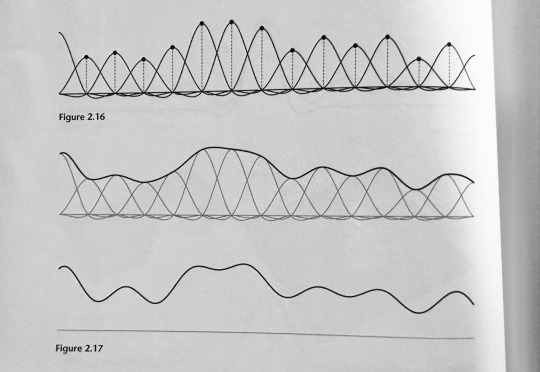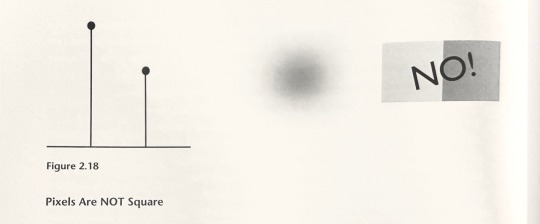Don't wanna be here? Send us removal request.
Text
“[It] becomes an enchanted loom where millions of flashing shuttles weave a dissolving pattern, always a meaningful pattern though never an abiding one; a shifting harmony of subpatterns.”
—Sir Charles Sherrington, Man on His Nature
Sir Charles Sherrington, the author of this section’s epigraph, used his famous “enchanted loom” metaphor to describe the waking cortex of the human brain... When [Sherrington’s metaphor] is operating at the tremendous speeds of today’s computers, the patterns of trillions of voltages warp and weave in an electronic dance that changes billions of times per second. Sometimes they weave movies out of whole cloth.
—Alvy Ray Smith, A Biography of the Pixel
4 notes
·
View notes
Text
line becomes landscape
you're under strain
time is mythical
but maybe soon enough
5 notes
·
View notes
Text
If Mother Nature produces a pattern, then Fourier’s great idea almost always works to describe it. Newton and Einstein knew that they were addressing the universe, and so did their admirers. Fourier didn’t or couldn’t foresee how universal his great musical idea was—nor did others at the time. We don’t have a word for genius accumulated through time or genius by ramification. Our usual notion of genius is local to a lifetime—both in accomplishment and in recognition. —Alvy Ray Smith, A Biography of the Pixel
11 notes
·
View notes
Text
Here’s the idea: digital can faithfully represent analog. The discrete and separated and spiky can accurately represent the smooth and joined and curved. The broken continual can truthfully represent the unbroken continuous.
...
Here’s Kotelnikov’s great idea: if you sample something smooth at twice its highest Fourier frequency, then you can always exactly recover the smooth something using only the samples. The samples are discrete, disjointed, separated from one another—definitely not smooth. This is the first part of his idea—the great Sampling Theorem.
...
There’s a name in the digital world for Kotelnikov’s samples of a visual field. We call them pixels.

So here’s the secret of the Sampling Theorem, and why it’s not really something for nothing. Any spreader (reconstruction filter) that we use, whether it’s the ideal one or not, is an analog shape: it has an analog infinity of points. By putting a spreader at each pixel—little blobs of infinity—and adding up the results, we effectively reintroduce analog infinity everywhere. The apparent nothing between pixels is covered by the something carried in the pixel spreader. It’s a very neat trick. The Sampling Theorem repackages infinity.

Another way to represent pixels is by looking at them from above, so to speak, so that you can “see” them in a natural way. But we can’t see pixels. It’s spread pixels that we see.
…
If you must give a shape to a pixel, then use the blobby image of spread pixels as your guide and remember the overlap with neighboring pixels. But really, truly, a pixel has no shape. It’s a point with zero diameter. Only spread pixels have shape. If it’s a pixel you can see—if it has a visible shape—then it must be a spread pixel.
— A Biography of the Pixel, Alvy Ray Smith
26 notes
·
View notes
Text
"Lautréamont's poetry, beautiful like a writ of expropriation... The first to have understood that poetry starts with excess, disproportion, quests deemed unac-ceptable, amidst the great blind tom-tom... up to the incomprehensible shower of stars."
Aimé Césaire, Isidore Ducasse, Comte de Lautréamont
20 notes
·
View notes
Text
“Most people are, like Leibniz’s possible worlds, only equally rightful pretenders to existence. Few exist.”
— Friedrich Schlegel, Athenaeum Fragments
51 notes
·
View notes
Text
How, then, will someone be in beauty when he doesn’t see it?
In fact, seeing it as different from himself, he will no longer be in beauty, but will come to be it – ‘in it’ in this extreme way. If, then, seeing is of that which is external, there should not be seeing, or else only the seeing in which one is identical with that which is seen. This is, in a way, comprehension and self-awareness, though one is careful not to be separated from oneself by relying too much on sense-perception.
One should think about this: the perceptions of evils have greater impact, but lesser intellectual effects because these are driven out by the impact. For sickness is more of a disturbance, whereas health in its restful accompaniment would give us comprehension of itself. For it settles in inasmuch as it is akin to us and unites itself with us. Sickness is alien and not akin to us, and this seems clear by its being exceedingly different from us.
---
Plotinus, Enneads, 5.8.11, transl. Lloyd P. Gerson
11 notes
·
View notes
Text
“From tiny experiences we build cathedrals.”
— Orhan Pamuk, from “The Art of Fiction No. 187,″ interview by Ãngel GurrÃa-Quintana, Paris Review (no. 175, Fall/Winter 2005)
17K notes
·
View notes
Text
“What a lot of things there are a man can do without.”
— Socrates, in Lives and Opinions of Eminent Philosophers, by Diogenes Laërtius
944 notes
·
View notes
Text
“…when the ability to hold two opposing ideas in the mind at the same time is mentioned as a mark of first-rate intelligence, Fitzgerald gives as an example ‘the ability to see that things are hopeless and yet be determined to change them.’”
Glenway Wescott, The moral of Scott Fitzgerald
32 notes
·
View notes
Text
If Mother Nature produces a pattern, then Fourier’s great idea almost always works to describe it. Newton and Einstein knew that they were addressing the universe, and so did their admirers. Fourier didn’t or couldn’t foresee how universal his great musical idea was—nor did others at the time. We don’t have a word for genius accumulated through time or genius by ramification. Our usual notion of genius is local to a lifetime—both in accomplishment and in recognition. —Alvy Ray Smith, A Biography of the Pixel
11 notes
·
View notes
Text
They don’t know that the music of war has no rhythm, and that we are rhymes sharing the same ending without an opportunity to sing.
Ramy Al-Asheq, "From Within" from My Heart Became a Bomb (translated by Nida Awine)
35 notes
·
View notes
Text
We find a place for what we lose. Although we know that after such loss the acute stage of mourning will subside, we also know that we shall remain inconsolable and will never find a substitute. No matter what may fill the gap, even if it be filled completely, it nevertheless remains something else.
Sigmund Freud. Letter to Ludwig Binswanger. Mourning and Melancholia. Standard Edition. 1917.
18 notes
·
View notes




